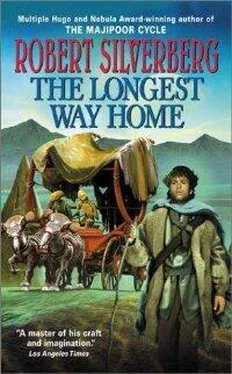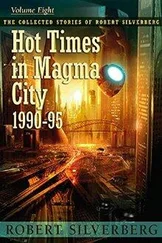The car pulled up at the edge of what looked like an untilled field. There was nothing in view anywhere around, no farms, no buildings. He saw a few trees a long way off. There was a scattering of gray clouds overhead.
“This is where you get out,” said the guard to his left. He opened the door, stepped out, waited.
“Here?” Joseph asked.
The guard nodded. He scowled and made an impatient backhanded gesture.
It made no sense. Here, in the middle of nowhere? This forlorn weedy field looked like exactly the sort of place where you would choose to take a prisoner to be executed, but if all they had wanted to do was kill him, why had they bothered to go through all this involved business of loading him on cars, flying him south, driving him around in the countryside? They could much more easily have shot him back at the camp. It would have caused no stir. Tens of thousands of Masters had been massacred in Manza already; the death of one more, even a stranded visitor from Helikis, would hardly make much difference in the general scheme of things.
“Out,” the guard said again. “This is wasting time.”
Very well, Joseph thought. Whatever they wanted. He was too tired to argue, and begging for his life was unlikely to get him anywhere.
The Folker pointed out into the field. “There’s the border marker, out there ahead of you. Now run. Run as fast as you know how, in the direction that I’m pointing. I warn you, don’t go in any other direction. Go! Now!”
Joseph began to run.
They will shoot me in the back before I have gone twenty paces, he told himself. The bolt will pass right through my pack, into my body, my lungs, my heart, and I will fall down on my face here in this field, a dead man, and they will leave me here, and that will be that.
“Run!” the guard called, behind him. “Run!”
Joseph did not look back to see if they were aiming at him, though he was sure that they were. He ran, ran hard, ran with all the determination he could summon, but it was a tough sprint. The ground was rough beneath his feet, and not even these last few days of decent meals had brought him back to anything like a semblance of strength. He ran with his mouth open, gulping for air. He felt his heart working too quickly and protesting it. Several times he nearly tripped over the extended ropy stem of some treacherous low-growing shrub, lurched, staggered, barely managed to stay upright. He thought back to that time, what seemed like a hundred years ago, when he had lurched and staggered and stumbled and fallen in the forest near Getfen and had done that terrible injury to his leg. He did not want that to happen again, though it was strange to be fretting about anything so minor as an injured leg when two men with guns might be taking aim at him from behind.
But the shot that he had expected did not come. A few moments more and he ascended a little rise in the field, and when he came down the far side he saw a broad palisade standing before him, a row of stout logs tightly lashed together set in the ground, and he realized that he had arrived at the dividing point that set the two worlds apart, the boundary between the territory of the Liberation and that which must still remain under the sovereignty of his own people.
There was a gate in the palisade and a guard-post above it. The grim faces of four or five men were looking out at him. Joseph thought he saw the metal face of a gun facing him also.
Bringing himself to a stumbling halt a few dozen yards before the palisade, he raised his arms to show that he intended no harm. He hoped that they were expecting him.
“Masters!” he cried, in his own language, with what was nearly his last gasp of breath. “Help me! Help! Help!”
Then the ground came rushing up toward him and Joseph seized it and held it, because everything was whirling around. He heard voices above him, saw booted feet standing beside him. They were lifting him, carrying him through the gate.
“What place is this?” he asked, speaking through a thin mist of exhaustion.
“House Eivoya,” someone said.
“You are Masters?”
“Masters, yes.”
He was lying in a bed, suddenly. There were bright lights overhead. They were washing him. Someone was doing something to his arm, attaching something to it. Someone else was wrapping a kind of collar around his left ankle. Joseph had the impression that they were explaining to him the things that they were doing to him, step by step, but none of it made much sense, and after a time he gave up trying to follow it. It was easier to go to sleep, and he did. When he awoke, sleep still seemed the easier choice, and he glided back into it. The next time he awakened there were two people in the room, a man and a woman, older people, both of them, watching him.
The woman, he discovered, was his doctor. The man introduced himself as Federigo Master Eivoya, of House Eivoya. “And what is your name?” the man said.
“Joseph. Joseph Master Keilloran. Am I still in Manza?”
“Southern Manza, yes. Just north of the Isthmus. —Can you tell me your father’s name, Joseph?”
“You don’t believe I am who I say I am? Or are you just trying to see whether my mind still works?”
“Please.”
“Martin is his name. Martin Master Keilloran. My mother was Mistress Wireille, but she’s dead. My brothers’ names—”
“You don’t need to go on.”
“So you believe me?”
“Of course we believe you. We needed to know, and now we do.”
The woman said, “You’ll want to rest for a while. You’re half starved, you know. They treated you very badly in that prison camp, didn’t they?”
Joseph shrugged. “I was in pretty bad shape when I got there. They didn’t make things any better for me, though.”
“No. Of course not.”
She gave him something to make him sleep again. He dreamed of Thayle, tiptoeing into the room, climbing naked into the bed beside him, taking his thin ruined body into her arms, holding him against the warmth of her, her firm abundant flesh. He dreamed he was in the village of the Ardardin, discussing the difference between the visible world and the invisible one. At last it all was clear to him. He understood what the Ardardin meant by the axis of the worlds upon which all things spin, and the place where mundane time and mythical time meet. He had never really managed to grasp that before. Then he was back in the forest with the noctambulo, who was reciting noctambulo poetry to him in a low monotonous voice, and then he was in his own room at Keilloran House, with his mother and his father standing beside his bed.
When he woke his mind was clear again, and he saw that there was a tube going into his arm and another into his thigh, and he knew that this must be a hospital and that they were trying to repair the various kinds of damage that his long journey had inflicted on him. A younger man who said his name was Reynaldo was with him. “I am Federigo’s son,” he told Joseph. “If you have things to ask, you can ask me.” He was about thirty, dark-haired, smooth-skinned, as handsome as an actor. Joseph had things to ask, yes, but he hardly knew where to begin. “Did the Folk conquer all of Manza?” he said, after a moment’s hesitation. That seemed like as good a starting-point as any.
“Most of it, yes,” Reynaldo said. “All but here.” He explained that the Masters had been able to hold the line at Eivoya, that the rebel forces in the far south had not been strong enough to break through it and eventually they had abandoned the attempt and worked out an armistice acknowledging the continued sovereignty of the Masters over the southern tip of Manza. The rest of the northern continent, he said, was in Folkish hands, and he supposed that most or all of the Great Houses had been destroyed. The fighting had ended, now. Occasional straggling survivors from the north still made their way down here, said Reynaldo, but they were very few and far between these days. He said nothing about any plans to reconquer the territory that had been lost, and Joseph did not ask him about that.
Читать дальше












